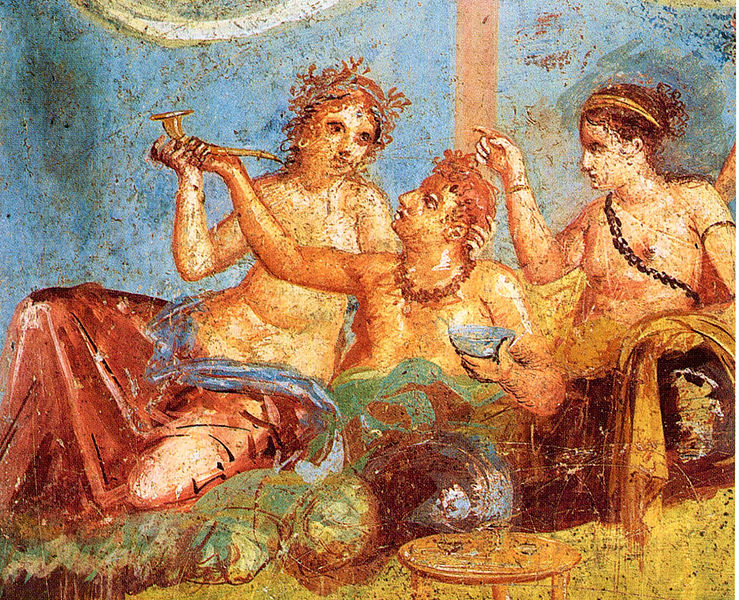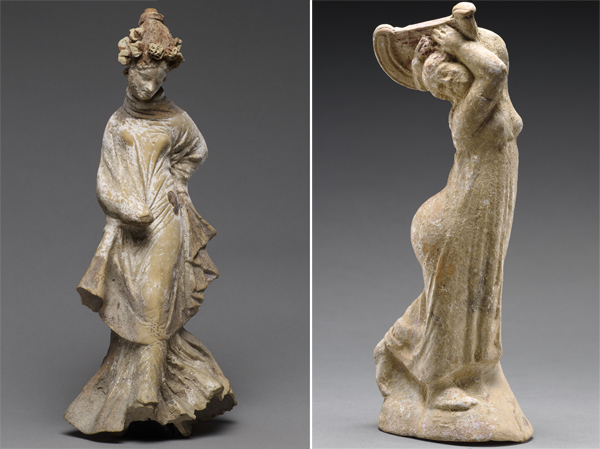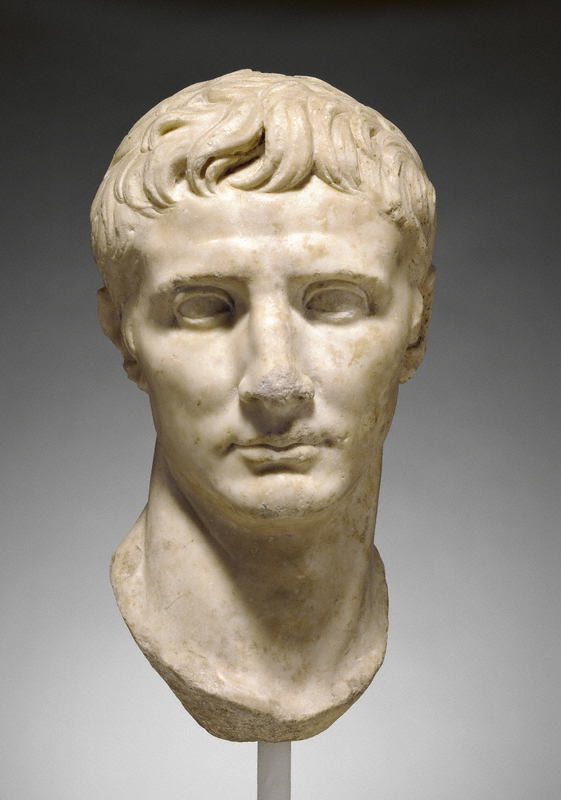
Roman fresco with banquet scene from the Casa dei Casti Amanti, Marisa Ranieri Panetta (ed.): Pompeji. Geschichte, Kunst und Leben in der versunkenen Stadt. Belser, Stuttgart 2005, author: Wolfgang Rieger
Throughout 2013, the Getty community participated in a rotation-curation experiment using the Getty Iris, Twitter, and Facebook. Each week a new staff member took the helm of our social media to chat with you directly and share a passion for a specific topic—from museum education to Renaissance art to web development. Getty Voices concluded in February 2014.
Though 21st-century flirting advice can seem plenty risqué, the ancient Ars Amatoria (Art of Love) by Roman poet Ovid is just as bawdy as love advice written today—maybe even more so. In fact, at times the book reads more like a seduction guide than a dating manual.
Men are the primary audience of the Ars Amatoria, and Ovid’s suggestions are helpful for that gender regardless of century: be physically presentable, use flattery, don’t forget her birthday, and don’t ask about her age. For women, Ovid’s advice covers flirting techniques and tips for one’s daily beauty routine, from hairstyles and clothes to make-up and face scrubs, all helpful for his large readership of young women with no access to Vogue. If too short, he suggests lying down and keeping feet hidden; ladies with thick fingers, on the other hand, should move their hands quickly when talking. For those preparing for love at a young enough age, he recommends learning how to sing and dance, for this is very attractive in a mate.

Everyone loves a dancer. Left: Statuette of a Dancer, 300–200 B.C., Greek, made in Taras, South Italy. Terracotta, 9 1/4 in high. The J. Paul Getty Museum, 96.AD.246. Right: Statuette of a Dancer playing the Lyre, 200–100 B.C., Greek, made in Sicily or South Italy. Terracotta and pigment, 7 7/8 in. high. The J. Paul Getty Museum, 73.AD.151
Ovid’s humor and impudence are evident throughout all of his works. Though he wrote under the reign of Augustus and his moral legislation, his works are lewd and satirical. Humorously, Ovid mentions several times that the Ars Amatoria is not for the eyes of married women, but he frequently depicts married women and their adulterous affairs. In one scene, the woman’s lover comes to dinner:
Your husband too will be present at my banquet—
I pray it’s his last meal, that man of yours!…
When he sinks on the couch, as you recline at the table
there be the face of modesty itself—secretly touch my foot!
Watch me and my nods, and loquacious expression:
pick up their secret messages and yourself reply.
Voiceless, I’ll speak eloquent words with eyebrows:
my fingers will write words, words traced out in wine.
When the lasciviousness of our lovemaking occurs to you,
touch your radiant cheek with a delicate thumb…
Despite Ovid’s popularity, Augustus showed no scruples about personally exiling him to Tomis, a rather dreadful place on the Black Sea. Was he finally being punished for work that violated the emperor’s moral legislation? Though Ovid suggested that Ars Amatoria was partly a cause for his exile, it likely wasn’t, because the book had already been in circulation for several years. No one knows what exactly the reason was, but it must have been significant to justify a personal decree from the emperor and no pardon, despite Ovid’s constant begging.

Ovid’s archfoe: Augustus, 25—1 B.C., Roman. Marble, 15 3/8 in. high. The J. Paul Getty Museum, 78.AA.261
Ars Amatoria sets straight some common misconceptions about the ancient Roman world. For example, dating was definitely allowed. There were plenty of chances to find lovers at the theater, horse races, and drinking parties. While their slaves stayed home to do all the work, elite men and women from Rome could socialize at public events.
Alas, Ars Amatoria is by no means a perfect guidebook for today. We can only chuckle when Ovid stipulates, in a businesslike fashion, that promising the moon is a helpful way to a girl’s bedroom, and be mildly horrified when he asserts that even if women resist, they want to have sex, so men should force themselves upon them.
Two choice quotes from Ovid follow. Is his advice still relevant?
An oval-shaped head suggests a plain parting:
that’s how Laodamia arranged her hair.
A round face asks for a small knot on the top,
leaving the forehead free, showing the ears.
One girl should throw her hair over both shoulders:
like Phoebus when he takes up the lyre to sing.
Another tied up behind, in Diana’s usual style,
when, skirts tucked up, she seeks the frightened quarry.
Blown tresses suit this girl, loosely scattered:
that one’s encircled by tight-bound hair.
This one delights in being adorned by tortoiseshell from Cyllene:
that one presents a likeness to the curves of a wave.
Neatness pleases, a body tanned from exercise:
a well fitting and spotless toga’s good:
no stiff shoe-thongs, your buckles free of rust,
no sloppy feet for you, swimming in loose hide:
don’t mar your neat hair with an evil haircut:
let an expert hand trim your head and beard.
And no long nails, and make sure they’re dirt-free:
and no hairs please, sprouting from your nostrils.
No bad breath exhaled from unwholesome mouth:
don’t offend the nose like a herdsman or his flock.
What do you say: Is Ovid’s dating advice really any different from today’s books and blogs in its stereotypes about how men and women should behave when seeking a mate? How, and how much, have things changed from ancient Rome to the 21st century?




Comments on this post are now closed.